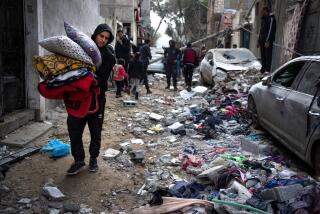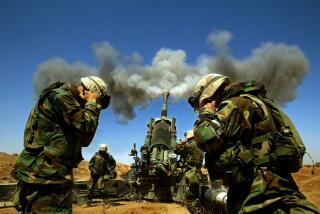A Blood Bath Beyond Our Grasp
- Share via
U.S. troops stationed in southern Iraq are reported to be anguished and horrified by the remorseless brutality they witnessed as Saddam Hussein’s forces moved to suppress the Shiite revolt against his tyrannical rule. They are not alone.
Senate Majority Leader George J. Mitchell (D-Me.), who voted against authorizing President Bush to use force to liberate Kuwait, now thinks U.S. planes should shoot down Iraqi gunships that are attacking rebel areas. Most Americans no doubt share Mitchell’s outrage over these indiscriminate attacks, and most would not be loath to support an intervention to help equalize the odds. But it seems clear that’s not going to happen, and that even if it did, the result in Iraq’s civil war wouldn’t change.
Shoot down all of Iraq’s gunships and it would still have all the tanks, guns and trained troops needed to crush the revolts by Shiites in the south and Kurds in the north. By now, indeed, suppression seems largely to have been accomplished. Thousands have been killed, many quite deliberately, as Baghdad has reasserted its despotic rule. Grim experience suggests that the bloodletting will go on even when resistance ends, as all who are simply suspected of sympathizing with the rebels are hunted down.
In the face of this hateful cruelty, what should the United States do?
The humane impulse--the emotional and moral urge--certainly is to move in to help the underdog. But how effective would that really be? From everything known about the balance of power in Iraq, it seems clear that if Saddam Hussein and Baath Party rule are to be overthrown, U.S. intervention would have to go all the way. That means nothing less than a march on Baghdad, probably followed by a long occupation. Any such effort by any Western nation would surely be a doomed cause, fated to draw widespread Arab enmity, even in time from those on whose behalf it was launched. It was a mistake not to insist in the provisional cease-fire agreement that Iraq’s helicopters remain grounded. But even if that had been done, the outcome of the tragically costly revolt against Saddam Hussein probably wouldn’t have been different.
More to Read
Sign up for Essential California
The most important California stories and recommendations in your inbox every morning.
You may occasionally receive promotional content from the Los Angeles Times.












